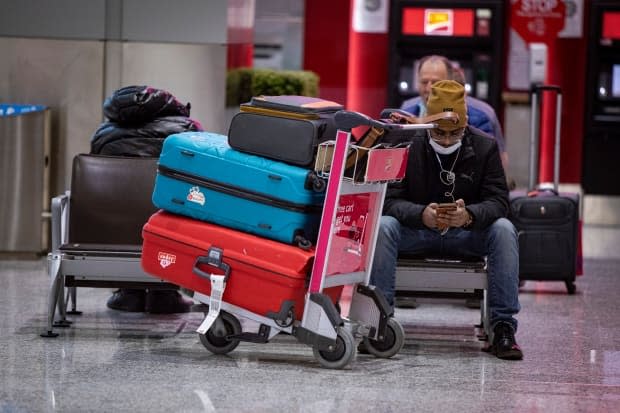Border workers vote to strike, putting Canada's reopening plans at risk

Canada's reopening plans could be hindered as thousands of border officers gird themselves for possible strike action.
The two unions representing more than 8,500 Canada Border Services Agency (CBSA) employees announced this morning that the majority of their members have given them a strike mandate.
That means they could begin strike action as soon as Aug. 6, mere days before Canada reopens the border to fully vaccinated U.S. residents, said the Public Service Alliance of Canada (PSAC) and the Customs and Immigration Union (CIU) in a news release.
Many border workers would be deemed essential — but the union said strike action could slow down commercial traffic at the border and ports of entry, hit international mail and parcel deliveries from Canada Post and other major shipping companies, and disrupt the collection of duties and taxes on goods entering Canada.
Prime Minister Justin Trudeau said it has been a tough year for border guards because, while they have had fewer crossings to process, they've been tasked with carrying out more stringent checks on travellers.
"We will be working very closely with the CBSA union to make sure that we are negotiating, getting to the bargaining table, trying to figure out a path forward," Trudeau said.
"We recognize that there have been challenges but we're going to work with them. We're hopeful that there won't be any disruptions."
The unions' members — who have been without a contract since June 2018 — include border service officers at airports, land entry points, marine ports and commercial ports of entry, inland enforcement officers, intelligence officers, investigators, trade officers, hearings officers and non-uniformed members.
Their essential services agreement permits 2,600 members to take full strike action, while essential workers can take work-to-rule actions in their workplace.
Window to avert strike 'quickly closing'
The unions have been fighting primarily for three things: salary parity with other law enforcement workers in Canada; better protections against harassment and discrimination; and a remote work policy for non-uniformed members.
"Truth be told, the CBSA is a problematic place to work," Mark Weber, national president of the Customs and Immigration Union, told a news conference Tuesday.
The union said a number of troubling cases have been forwarded to it over the past few years — including a report of a male supervisor physically assaulting a female officer in front of several witnesses without repercussions and another report of a manager forcing officers to conduct an illegal strip search of a bus full of students.

Chris Aylward, PSAC national president, said the unions are hoping the government will return to the negotiating table.
"I had a meeting with the prime minister two months ago. I told the prime minister that if they wanted a smooth reopening of the border, then they have to come back to the bargaining table with a fair offer, which we have not seen yet," he said Tuesday.
"Their window to avert a strike is quickly closing."
A spokesperson for the Treasury Board said it believes PSAC rejected a fair offer.
"We are disappointed that PSAC rejected a fair offer for its members at the Canada Border Services Agency that included wage adjustments and provisions in line with recent agreements reached with PSAC and other bargaining agents that cover over 88 per cent of public servants," said Geneviève Sicard.
"Going forward, our goal is to take constructive steps to advance negotiations. We remain open to returning to the bargaining table at any time."
Last week, when the strike vote was ongoing, the CBSA said the agency is preparing for a possible work disruption.
"The Canada Border Services Agency will respond quickly to any job action/work disruption in order to maintain the security of our border, ensure compliance with our laws and facilitate the flow of legitimate goods and travel," said Louis-Carl Brissette Lesage in an email to CBC News.
WATCH | Fauci says prospect of reopening border part of active U.S. government discussions
"We expect that our officers will continue to fulfil their duties with the highest level of integrity and professionalism."
Last week, the federal government announced plans to let fully vaccinated tourists visit Canada again soon.
Starting Aug. 9 at 12:01 a.m. ET., fully vaccinated U.S. citizens and permanent residents living in that country will be able to visit Canada.
The government said it plans to open Canada's borders to fully vaccinated travellers from all other countries on Sept. 7.

